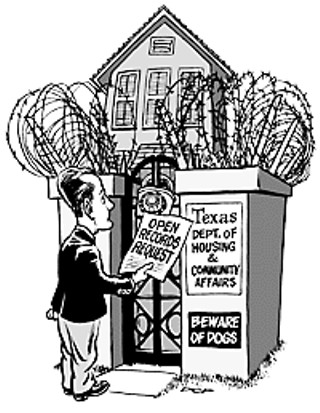Naked City
Hands Off Housing
By Kevin Fullerton, Fri., July 13, 2001

There's not a state agency in Texas that's been called on the carpet as often as the Texas Dept. of Housing and Community Affairs: In recent years, its staff has been grilled by legislators and its records sifted by auditors -- all in an effort to figure out whether TDHCA distributes housing subsidies fairly and effectively. In the last legislative session, lawmakers passed a sunset bill intended to expose TDHCA's processes to public view, and the TDHCA board agreed to make documents more accessible. But when the agency recently received an open records request from a nonprofit builders group that's long been critical of the way TDHCA runs its low-income housing tax-credit program, TDHCA sent the request into legal limbo -- where it's likely to stay until after the agency completes its next major allocation of tax credits on July 31. TDHCA annually distributes more than $200 million in tax credits to spur construction of apartment complexes with below-market rents, a competitive program that never fails to generate controversy.
Mike Dunn, policy analyst for the Texas Association of Community Development Corporations, says the housing agency is "stiff-arming" his group's attempt to test the openness of the tax-credit program. The TACDC represents about 400 nonprofit builders across the state, most governed by local volunteer boards, who routinely get the short end of the stick when competing for tax credits. The housing agency allots only about 10% of its total awards to nonprofits, and much of that goes to organizations closely connected to for-profit developers. TACDC has been among the groups that have complained that the housing agency prioritizes projects from developers with connections at the agency over developments with the highest merit.
Developers' applications for tax credits are public records, but TDHCA has always kept them under wraps until after it has handed out the awards. The agency has routinely discarded applications for developments that didn't get funded, making it difficult to review its decisions. Dunn says he had hoped that the agency's new rules making applications accessible earlier would make it easier to compare projects' merits -- not to mention providing sport for the perennial agency watchdogs, who were betting they could predict which projects would win approval based on whose names were attached. The critics hoped the changes would enable them to appeal quickly to the TDHCA board if the agency followed its old habits of favoring the same group of developers.
But the housing agency's staff determined that TACDC's request asked for information exempted from public disclosure and appealed the matter to the state attorney general. According to rules adopted this year by the TDHCA board (over the objections of agency staff, who recommended keeping all application information secret), portions of developers' applications are open to the public prior to the July allocation of tax credits, but certain proprietary and financial information can be withheld. But Dunn says TACDC never expected to get sensitive financial details through its open records request (which asked for a "full copy" of the applications), and he says agency staff knew full well TACDC wasn't asking for it. Right under the agency rule that proclaims the applications are public information, Dunn notes, it's clearly stated that proprietary information is not public.
"It's obvious. A quick call to us would have cleared that up immediately. … They're threading a legal needle to deny our information request," says Dunn. Dunn says the TACDC asked for a full copy of the applications to make sure the agency didn't provide merely the cursory information it makes available on its Web site, which doesn't include all the names of partners involved in tax-credit projects.
As a response to TACDC's open records request, the housing agency sent a letter to the developers who submitted tax-credit applications this year, notifying them of their right to appeal directly to the AG to withhold information in their applications. "You are not required to submit briefing," the letter warns, but "your failure to take timely action will result in the requested information being released to the public."
Dunn says before his organization even got an agency response to its open records request, TACDC received a call from a developer demanding to know why it wanted information from his application and threatening to call the attorney general. "That's ridiculous, for them to go through all this," says Dunn. "They are not adhering to the spirit of the public information act. Whether that's intentional or not is up for interpretation." But TDHCA staff attorney Monita Rose Johnson-Henley responds that, "There was no indication that TACDC only wanted certain portions of the applications. … If you do not want a full tax credit application, then you should clarify what you want."
The housing agency's executive director, Daisy Stiner, said in a letter to TACDC Director Reymundo Ocañas that the agency is obligated by the Texas Public Information Act to notify all third parties when a request is made for proprietary information. Michael Lyttle, an agency spokesperson, says TDHCA followed the letter of the law in handling TACDC's request and had no ulterior motives for withholding anything. "There was no intent to yank TACDC's chain," says Lyttle. He says the agency has invited TACDC to submit a narrower request that it could fill immediately.
But Dunn says a new request would only instigate a new round of stonewalling. He says the agency is determined to fend off TACDC's request until after tax credits are awarded July 31. The TACDC has instead appealed to the attorney general's office, asking for an immediate decision on the matter.
Got something to say on the subject? Send a letter to the editor.








